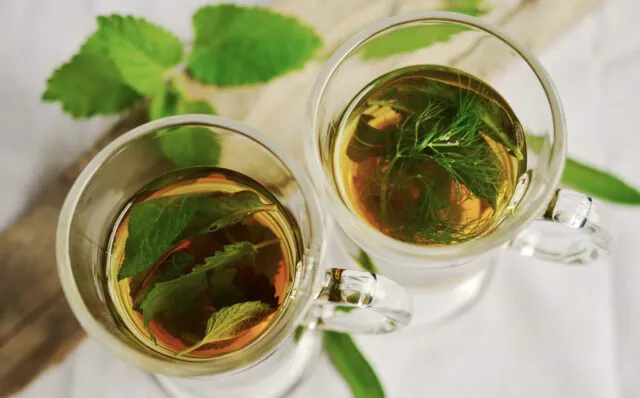Chronic inflammation is a reversible condition, but you should give yourself enough time, start a specific treatment and combine it with regularity.
It should also be remembered that, for example, inflammation of the thyroid gland is directly related to other organs and entire systems, so you should look at the body holistically and take care of all its aspects. Here, both antioxidants (also known as antioxidants) and herbs with antioxidant properties will help. They can be used together or interchangeably.
Antioxidants include:
1. Vitamins: A, C, E, Q10, B vitamins, carotenoids, bioflavonoids.
2. Minerals: selenium, zinc, manganese, copper, magnesium.
3. Amino acids, peptides and metabolites: cysteine, lipoic acid, uric acid, bilirubin, glutathione.
4. Enzymatic proteins: glutathione peroxidase, glutathione reductase, superoxide dismutase, catalase.
5. Hormones: melatonin, estrogen.
6. Other compounds: indoles, terpenes.
As you can see, there is a variety of antioxidants. You'll find them in herbs and spices, among others, so we'll start with them as your primary source of antioxidants for you and your family.
 Garlic
Garlic
Who doesn't know it for its intense flavor and specific aroma. Garlic is either loved or not. For people who care about their appearance and health, garlic should be a permanent spice in their daily diet. It is best when it is fresh, Polish garlic. This spice is known mainly for its immune stimulant properties. However, as an antioxidant, it is also powerful, like other of the most powerful antioxidants. It can definitely be said that it is one of the strongest, most effective and most versatile antioxidants. The reason is very simple, garlic contains many compounds with antioxidant properties, such as manganese, zinc, selenium, germanium, vitamins A and C. In this combination, they create a unique, perfect cocktail. Apart from garlic, it is worth remembering about onion, leek and chives. The onion in particular will have a holistic effect as it also has probiotic properties.
 Curry
Curry
Also used as garlic as a spice, but mainly in Indian countries, it is also increasingly used on Polish tables. Curry is a mixture of herbs and its characteristic ingredient is turmeric. It is mainly turmeric and the curcumin contained in it have antioxidant properties.
Herbs that are worth drinking and reaching for them as often as possible are green tea (Camellia sinesis) and ginkgo biloba (gingko). Green tea is a rich source of polyphenolic compounds, which largely contribute to its antioxidant properties. Green tea has anti-cancer and antibacterial properties, lowers cholesterol and triglycerides, protects the vascular endothelium from damage. The healthier version of green tea is its powdered leaves, i.e. green tea called matcha. Ginkgo biloba improves blood circulation. Scientific research has shown that this herb has a beneficial effect on the brain by protecting neurons against free radicals. The main active ingredients of ginkgo biloba are terpenes, bilobalides, campherol, quercetin and other bioflavonoids, i.e. substances with strong antioxidant properties.
 Milk thistle
Milk thistle
Another herb that requires special attention is milk thistle (Silybum marianum). It is a plant with a high content of silymarin, i.e. a substance that protects the liver and improves its antioxidant and detoxifying functions. Silymarin increases the level of glutathione in liver cells, hence its strong properties supporting the functioning of this organ. Especially when detoxing and supporting the thyroid organ, liver support and regeneration should also be considered. Here, milk thistle will definitely come to the rescue. It can be used in oil or dried. I definitely recommend the oil version, which will additionally "moisturize" the body from the inside. Milk thistle is best used in the evening after dinner.
You should be careful when supplementing with minerals and vitamins, and it is best to consult a specialist.
Selenium is a trace element that plays an important role in the functioning of the thyroid gland, and its deficiency is considered to be one of the causes of Hashimoto's disease. Selenium acts as a catalyst converting inactive thyroxine (T4) into biologically active triiodothyronine (T3). Scientific research proves that selenium supplementation reduces the amount of anti-thyroid antibodies in Hashimoto's disease and reduces its symptoms, and improves the results of research in Graves disease. A safe daily dose of selenium is 200 - 400 mcg in the case of thyroid diseases.
Magnesium
Magnesium, among other things, improves the condition and functioning of the damaged thyroid gland. As part of supplementation with this element, you can choose its various forms depending on other accompanying ailments. If you suffer from constipation, choose magnesium in the form of citrate, and if you have diarrhea, glycinate is better. On the other hand, if you want to stimulate the metabolism and lose a few extra pounds, magnesium malate will be a good choice. Start supplementation with the minimum daily dose and monitor your body. You can temporarily increase the dose, but after a certain period of time when the body is saturated, return to the recommended daily dose.
. Zinc
After supplementing with zinc, the activity of the thyroid gland is leveled, it is an element necessary for its detoxification and proper functioning. Just like selenium supports the synthesis of T4 into T3, you also need it for the production of TSH. By interacting with vitamin E, it strengthens the immune system and thyroid function, and keeps the heart, liver and pancreas healthy. For supplementation, choose the form of zinc picolinate, and the daily dose should not exceed 30 mg.
Vitamin C
Vitamin C is especially known for its immune stimulating properties. It is also essential for skin regeneration as it participates in collagen biosynthesis. It is also involved in the production of neurotransmitters, as well as the absorption of iron and calcium from the gastrointestinal tract. Vitamin C circulating freely in the intracellular space neutralizes the free radicals encountered along the way, before they can do any damage. The best known form of vitamin C is l-ascorbic acid. Unfortunately, this form is not conducive to people struggling with digestive system diseases, especially when the gastric mucosa is sensitive. For such people, the best solution is a mild form of vitamin C, which additionally does not cause diarrhea, i.e. sodium ascorbate. The daily dose of vitamin C should be selected individually. It is best to start supplementation with the daily dose, double the dose after a week and observe the body. Vitamin C also works with other antioxidants. It is estimated that up to 18% of the antioxidant potential of vitamin E and 13% of the potential of beta-carotene depends on vitamin C.
melatonin
Let us also pay attention to melatonin. It is an antioxidant that your body can produce itself. The factory that produces melatonin is the pineal gland, and its highest level in the body occurs between 21-23. This is when your body produces the most melatonin, which also plays a role in regulating sleep. The only thing that needs to be done for the production of melatonin in the body to be at an optimal level is to go to bed around 21pm. Melatonin shows special relationships with the mitochondria of cells. Mitochondria are the producers of energy for cells and the whole organism. They produce a fuel called ATP (adenosine triphosphoric acid) that is burned by the body. By affecting certain functions of the thyroid gland, melatonin regulates the release of energy into the mitochondria and from there to the various organs of the body.
During this function, melatonin acts as an antioxidant, catching up free radicals produced by the mitochondria during the transformation of oxygen necessary for the production of ATP. So melatonin tells the mitochondria when to start working, deals with the by-products of that activity, and then delivers their product to the rest of the body. The result of its function is to increase the level of energy available to the body. The younger you are, the more melatonin you have and the more energy you have.
When you are no longer so young and your pineal gland begins to weaken, more melatonin can restore your energy levels to a higher level and make you feel younger. If you are considering supplementing with melatonin, consult a specialist first, especially if you are taking medications that boost your immune system, increase serotonin levels, lower blood pressure, or increase hormone secretion, as this can lead to their interaction with melatonin. Even when using aspirin, oral contraceptives, prozac, valium, or thyroid medications, it is not advisable to take melatonin.
Antioxidants and herbs supporting the body's work in chronic inflammation are the basis of a strengthening and regenerating treatment. From among all the available ones, choose those that you can successfully apply regardless of the condition of other organs, in other cases consultation and appropriate tests are necessary.
Watch Susan's broadcasts on the topic in the article:



